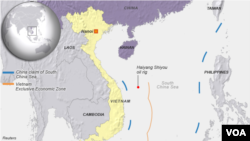HANOI —
Vietnam says Chinese ships repeatedly rammed and used water cannons against Hanoi's patrol vessels in the South China Sea, where Beijing has placed an oil rig in disputed waters near the Paracel islands.
Vietnamese officials revealed a video they say shows the Chinese navy vessels ramming Vietnamese ships.
According to Tran Duy Hai, deputy head of Vietnam's national border committee, there were as many as 80 Chinese vessels, including seven military ships, deployed to guard the rig.
Officials with Vietnam's maritime police and coast guard said several Vietnamese sailors were injured and several ships damaged in the clashes, which occurred multiple times in the past several days.
In an announcement on its website Saturday, the Maritime Safety Administration of China (MSAC) announced that all vessels should stay 1.6 kilometers away from the rig, expanding that to five kilometers on Monday. The $1 billion rig is owned by China's state-run CNOOC oil company and it had been drilling south of Hong Kong.
Last week, China announced it had placed a state-run oil rig near the Paracel Islands, 220 kilometers from Vietnam's shores, in the area Hanoi claims as its exclusive economic zone. China claims nearly all the South China Sea.
Vietnamese Ministry of Foreign Affairs officials said they had contacted Chinese authorities eight times over the issue, with meetings in Hanoi and Beijing. The foreign ministry says it is "resolutely opposed" to the drilling and has demanded the rig, which is surrounded by military vessels, be removed.
US describes action as 'provocative'
U.S. State Department spokeswoman Jen Psaki said Tuesday the move to relocate the rig is "provocative" and will further raise regional tensions.
"Given the recent history of tensions in the South China Sea, China's decision to operate its oil rig in disputed waters is provocative and unhelpful to the maintenance of peace and stability in the region," she said. "These events point to the need for claimants to verify their claims in accordance with international law and reach agreements about what types of activities should be permissible within disputed areas."
China stands firm
China, meanwhile, says the drilling platform is in an area under Chinese sovereignty and says it should not be "harassed" by Vietnamese authorities.
Foreign ministry spokeswoman Hua Chunying also slammed the United States for making what she called "irresponsible remarks" about the dispute.
"Chinese enterprises operating in the area of China's Paracel Islands is absolutely within the scope of China's sovereignty," she said. "It has nothing to do with Vietnam and even less to do with the United States."
The HD-981 rig belongs to the China National Offshore Oil Corporation, the country's third largest national oil company. It had been drilling near Hong Kong.
The Maritime Safety Administration of China on Monday warned all vessels to stay at least five kilometers away from the rig.
In addition to Vietnam, Brunei, Malaysia, the Philippines and Taiwan also have territorial disputes with Beijing in the oil-rich and strategic South China Sea.
The rival claimants accuse China of using increasingly aggressive tactics to defend its territory. China claims almost the entire area based on ancient maps.
Vietnamese officials revealed a video they say shows the Chinese navy vessels ramming Vietnamese ships.
According to Tran Duy Hai, deputy head of Vietnam's national border committee, there were as many as 80 Chinese vessels, including seven military ships, deployed to guard the rig.
Officials with Vietnam's maritime police and coast guard said several Vietnamese sailors were injured and several ships damaged in the clashes, which occurred multiple times in the past several days.
In an announcement on its website Saturday, the Maritime Safety Administration of China (MSAC) announced that all vessels should stay 1.6 kilometers away from the rig, expanding that to five kilometers on Monday. The $1 billion rig is owned by China's state-run CNOOC oil company and it had been drilling south of Hong Kong.
Last week, China announced it had placed a state-run oil rig near the Paracel Islands, 220 kilometers from Vietnam's shores, in the area Hanoi claims as its exclusive economic zone. China claims nearly all the South China Sea.
Vietnamese Ministry of Foreign Affairs officials said they had contacted Chinese authorities eight times over the issue, with meetings in Hanoi and Beijing. The foreign ministry says it is "resolutely opposed" to the drilling and has demanded the rig, which is surrounded by military vessels, be removed.
US describes action as 'provocative'
U.S. State Department spokeswoman Jen Psaki said Tuesday the move to relocate the rig is "provocative" and will further raise regional tensions.
"Given the recent history of tensions in the South China Sea, China's decision to operate its oil rig in disputed waters is provocative and unhelpful to the maintenance of peace and stability in the region," she said. "These events point to the need for claimants to verify their claims in accordance with international law and reach agreements about what types of activities should be permissible within disputed areas."
China stands firm
China, meanwhile, says the drilling platform is in an area under Chinese sovereignty and says it should not be "harassed" by Vietnamese authorities.
Foreign ministry spokeswoman Hua Chunying also slammed the United States for making what she called "irresponsible remarks" about the dispute.
"Chinese enterprises operating in the area of China's Paracel Islands is absolutely within the scope of China's sovereignty," she said. "It has nothing to do with Vietnam and even less to do with the United States."
The HD-981 rig belongs to the China National Offshore Oil Corporation, the country's third largest national oil company. It had been drilling near Hong Kong.
The Maritime Safety Administration of China on Monday warned all vessels to stay at least five kilometers away from the rig.
In addition to Vietnam, Brunei, Malaysia, the Philippines and Taiwan also have territorial disputes with Beijing in the oil-rich and strategic South China Sea.
The rival claimants accuse China of using increasingly aggressive tactics to defend its territory. China claims almost the entire area based on ancient maps.







